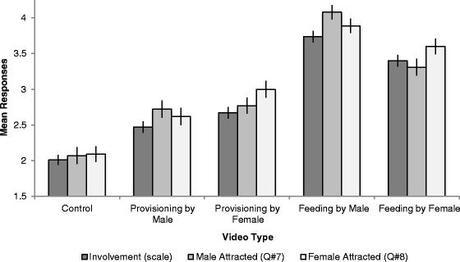It’s often said that “the way to a man’s heart is through his stomach”, but is there any scientific merit to this idea? And what of the reverse? After all, men are often expected to pay for their dates’ meals. Does providing your partner with food improve your chances romantically? In the animal kingdom this is known as “courtship feeding”, yet it seems to be absent from humans.
After all, no known culture openly trades sex for food (outside of prostitution). A hunter brings down a gazelle with a spear on the Savannah and offers a potential partner some meat and she’ll say it doesn’t influence her decision over whether to make hunter-gatherer babies together (or vice versa, after women in these societies tend to provide half of the calories in the diet; if not more than that).
Yet new research by psychologists suggests courtship feeding is still alive and well in humans, we just don’t realize it. They showed more than 200 students videos of couples doing a variety of (completely innocent) things with food. In one scenario there was none present, the two people just talked. In another they were simply eating together. Then they ratcheted up the sauciness (pun completely intended), with one person giving the other some of their food. The final, most scandalous scenario, involved one member of the couple feeding the other.

How “intimate” the dates were rated. “Provisioning” refers to sharing food, feeding is self explanatory
When asked to rate how “intimate” the date was and how strong a relationship the two people had with each other, the more food was involved the more highly the date was ranked; despite the fact people say food sharing doesn’t influence their choice in mates. So, perhaps evolution has left us with an appreciation for courtship feeding after all. Right?
WRONG
This study highlights a very common flaw with a large swathe of evolutionary psychology; and is the second reason you should be skeptical of claims made about evolution influencing our cognition (the first being that such studies tend to rely on un-representative samples, an issue I’ve discussed before). And what is the big problem here? Congruence bias.
This is the fallacy of not indirectly testing your idea. The example wikipedia gives is if you’re shown two buttons and told the left-hand button opens the door. You could press it, vindicating what you were told. You could also test the claim by pressing the right-hand button. The door shouldn’t open, if the experimenter was telling the truth.
This is why it’s very important to have good controls when doing research. But surely, I hear you say, there was a control in this experiment. And you’d be right, they had the people who weren’t eating. But that also means they weren’t really participating in an activity together. If you peel back the facade of food sharing, what this study really says is “talking + an activity is more intimate than just talking.”
To say something meaningful about courtship feeding you need that indirect test to rule out the fact more is going on in the feeding date. Even if you used something really unsexy, like golf, I still reckon you’d see a rise in intimacy rating as the couple did that activity together. You could even have it rise in scandal, like the eating. It starts with just playing golf together. Then one of them starts helping the other. The final stage could be the hands on “teaching them how to swing”.
And then if you got college students to rate these dates I still reckon you’d see a spike in intimacy as they did more stuff together and in closer physical proximity. These are the effects that you need to rule out before you can make any meaningful statements about human evolution and courtship feeding. And a lot of other EvoPsych research also suffers from this flaw, failing to indirectly test the hypothesis to prove your effect really does exist (although it isn’t a flaw limited to evolutionary psychology, other aspects of EvoAnth get it wrong too).
So this research doesn’t really show that your relationship will improve if you feed your partner. Alas, I’m not sure this will convince my girlfriend that I shouldn’t buy her fancy desserts.
Reference
Alley, T. R., Brubaker, L. W., & Fox, O. M. (2013). Courtship Feeding in Humans?. Human Nature, 24(4), 430-443.

